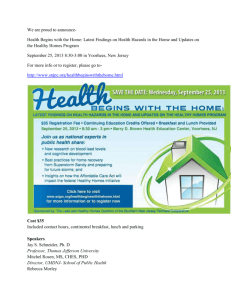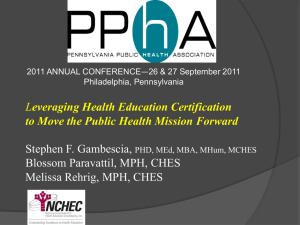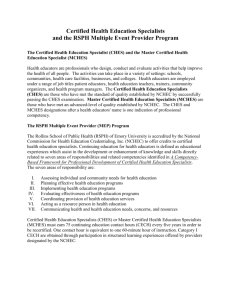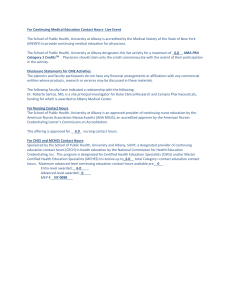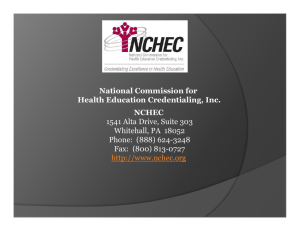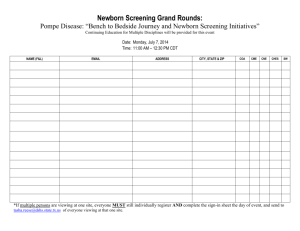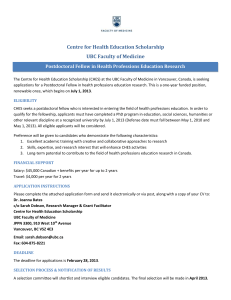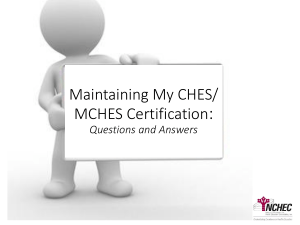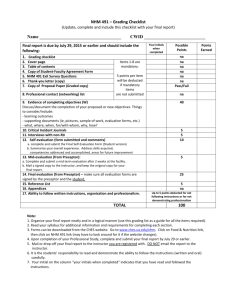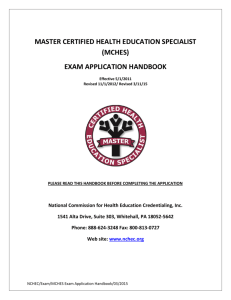CHES - Oregon Public Health Association
advertisement
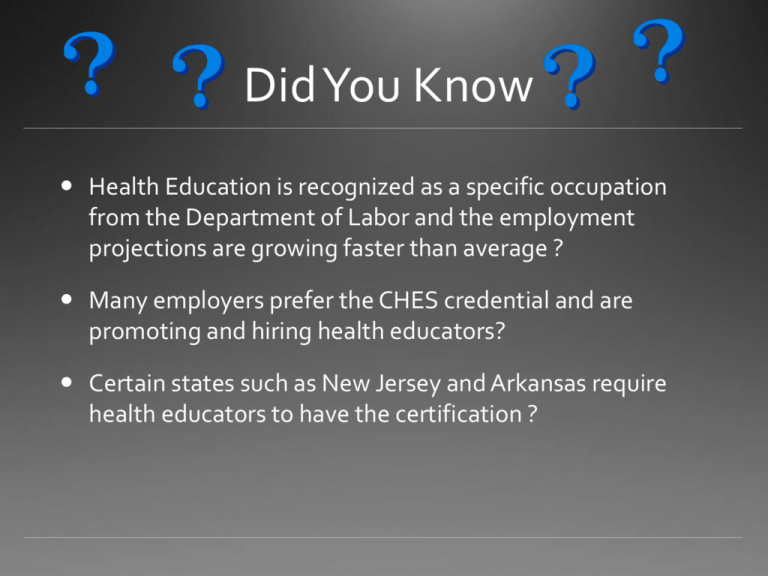
Did You Know Health Education is recognized as a specific occupation from the Department of Labor and the employment projections are growing faster than average ? Many employers prefer the CHES credential and are promoting and hiring health educators? Certain states such as New Jersey and Arkansas require health educators to have the certification ? CHES: Why I have these letters after my name and why you should too Alissa Leavitt, MPH, CHES Gwyn Ashcom, MPH, CHES Laura Chisholm, MPH, MCHES Julie A. Reeder, PhD, MPH, MS, CHES Learning Objectives: At the end of this presentation, participants will be able to: Identify ways the CHES/MCHES brings added credibility among colleagues and employers Describe how the CHES/MCHES enhances individual professional development, knowledge and skill sets, while also contributing to the enhancement of the profession List the Seven Areas of Responsibility that make up the standards of the CHES/MCHES credentials Learning Objectives: At the end of this presentation, participants will be able to: Identify and network with colleagues interested in preparing and taking the exam together Understand CHES/MCHES exam logistics including eligibility, preparation, dates and locations Agenda History and background of NCHEC Overview of CHES & MCHES Panel presentations Exam eligibility Questions Networking NCHEC’s Mission National Commission for Health Education Credentialing Enhances the professional practice of Health Education by promoting and sustaining a credentialed body of Health Education Specialists To meet this mission Certifies health education specialists Promotes professional development Strengthens professional preparation and practice CHES Certification This certification has been developed for health education professionals mastery of the fundamental skills across all practice settings voluntary credentialing What is a CHES? A CHES is an individual who has: Met academic eligibility Passed a written examination An ongoing commitment to continuing education and professional development Benefits of Certification C - Certified H - Health E - Education S - Specialist Establishes national standard Attests to individual’s knowledge and skills Assists employers in identifying qualified practitioners Sense of pride and accomplishment Promotes continued professional development Think, Pair & Share What kind of skills and competencies would you expect a CHES to have? Health Education Specialists: Seven Areas of Responsibilities Assess Plan Implement Evaluate/Research Administer Communicate/Advocate Act as a Resource CHES Eligibility Requirements Bachelor’s, Masters or Doctoral degree from an accredited institution AND A major in: health education, community health education, public health education, school health education OR 25 semester hours (37 quarter hours) specific to course work related to competencies Panel Presentation Gwyn Ashcom, MPH, CHES Health Educator Center for Student Health and Counseling Portland State University gwyn@pdx.edu Work History MPH (PSU) Health Promotion & Education – 2006 Portland State University – Health Educator in the Center for Student Health and Counseling – 1999 to present Various roles along the way Portland State University Adjunct Faculty – School of Community Health – 2010 to present Professional Background Past certifications, trainings & experience American College Health Association Secretary elect for the executive leadership committee of the Health Promotion Section – 2012 NCHEC Division Board for Professional Preparation and Practice – 2011 - present Certified Wellness and Health Coach, Wellcoaches, 2010 present. Trained Workshop leader for Oregon’s Living Well with Chronic Conditions Program – 2010 - present. CHES, NCHEC, 2007- present. Instructor certified for CPR, AED (Automated External Defibrillator), and First Aid, Red Cross, 2011 - present and through the American Heart Association, 2002 - present. Why I Became a CHES Credibility!! Especially when working in a clinical setting - credentialing legitimizes the work I do. Continuing Education Opportunity to grow as a professional. Helps me to stay current. Networking and expanding beyond College Health Connect with others in the field. Seven Areas of Responsibility Project: PSU Smoking Policy Problem identification, campus surveys, latest research and benchmarking I. Assess needs, assets and capacity for Health Education 1.1. Plan Assessment Process 1.3: Collect Quantitative and/or Qualitative Data Related to Health 1.7: Infer Needs for Health Education Based on Assessment Findings Campus/community conversations II. Plan Health Education 2.1: Involve Priority Populations and Other Stakeholders in the Planning Process 2.2: Develop Goals and Objectives 2.5: Address Factors That Affect Implementation Seven Areas of Responsibility Provide a report and recommendations to the Administration III. Implement Health Education 3.1: Implement a Plan of Action V. Administer and Manage Health Education 5.3: Demonstrate Leadership 5.5: Facilitate Partnerships in Support of Health Education VI. Serve as a Health Education Resource Person 6.1: Obtain and Disseminate Health-Related Information 6.3: Serve as a Health Education Consultant Seven Areas of Responsibility New policy written in 2008. Revised policy currently being prepared for 2013 based on lessons learned and the issue becoming a “hot topic” in college health as well as in the state of Oregon. VII. Communicate and Advocate for Health and Health Education 7.2: Identify and Develop a Variety of Communication Strategies, Methods, and Techniques 7.4: Engage in Health Education Advocacy 7.5: Influence Policy to Promote Health Panel Presentation Laura Chisholm, MPH, MCHES, RYT Self-Management Technical Lead Center for Prevention and Health Promotion, Oregon Public Health Division/OHA laura.f.chisholm@state.or.us Work History MPH ( PSU) – Health Promotion & Education, 1999 Professional Experience: Free-lance health writer 1998-2000 Writer/Editor, online health management application product manager at WellMed (now WebMD) 2000-2002 Oregon Public Health Division 2002-2012 Founding coordinator, Oregon AWARE* Health Systems & Self-Management Coordinator Quit Services Manager (Tobacco Quit Line) Chronic Disease Self-Management Technical Lead *The only time my job title was Health Educator! Professional Background Past certifications, training & experience Emergency Medical Technician (ski patrol/lifeguard) Stanford Chronic Disease Self Management Program Leader & Master Trainer Peer Critical Incident Debriefer Registered Yoga Teacher Certified Mindful Coach Mindfulness meditation and stress reduction Motivational Interviewing What I Really Do Birds-eye view: administration of state-level health education program infrastructure Manage federal grants and administer programs Coordinate training and technical assistance to local partners who provide programs Manage multi-year projects Grant writing & reporting Provide strategic direction for programs (sustainability) Self-management program business plan Track developments in the field, monitor trends & opportunities Why I Became a CHES Stay connected to my original training & grounded in my area of personal interest Individual behavior change perspective is a key aspect of improvement of population-level health outcomes Keep my skills up through continuing education Get credit for work-related experience Move out of my comfort zone, try new things Networking, professional and personal growth Stay aware of the larger context, developments in the field Enhance legitimacy of health education as a profession Why I Became an MCHES Time to take my career to the next level Consolidate and acknowledge a decade of experience Expand opportunities for mentoring Unique opportunity to get advanced certification through experience documentation (no exam!) Increased continuing education requirement Get credit for work-related experience Expand knowledge base and keep things fresh Seven Areas of Responsibility V: Administer and Manage Health Education 5.1.2 – Prepare requests/proposals to obtain fiscal resources (translation: GRANT WRITING!) Project planning and management Program and budget planning Writing, editing, editing, and more editing What we’ve funded Healthy Communities grants to counties Patient Self Management Collaborative State arthritis program Implementation of self-management business plan Things I Got Credit For Gave invited presentations at national-level conferences & continuing education events 4.5.4: Disseminate research findings through national conference presentations Served as an invited member of a national-level advisory committee 6.3.5: Provide expert assistance Analyzed bills and prepared testimony for a state legislative committee 7.5.1: Use evaluation & research findings in policy analysis Panel Presentation Julie A. Reeder, PhD, MPH, MS, CHES Senior Research Analyst Oregon State WIC Program julie.a.reeder@state.or.us CHES/MCHES Exam The CHES Examination Style & Structure Competency-based Pencil-and-paper exam 165 multiple choice questions; 150 scored, 15 pilot Identifies each Area of Responsibility Offered at over 120 testing locations nationwide Study companion available The MCHES Examination Style & Structure Provided at the same sites where CHES exam offered 3 hours to complete 165 multiple choice questions; 150 scored, 15 pilot Stand alone & scenario-based multiple choice items Covers all 7 Areas of Responsibility CHES/MCHES Certification Requirements Pass written examination Annual renewal fee 75 hours of continuing education within five-year cycle Recertify at the fifth year if Renewal fees paid Continuing education requirement met Employment Opportunities CHES/MCHES Employer Video Future Goals of NCHEC Market CHES and MCHES certification to employers Enhance professional development for CHES and MCHES Advocate for third-party reimbursement of health education specialists Required university accreditation for CHES exam eligibility What questions do you have? Thank you! Alissa Leavitt, MPH, CHES Faculty- Health Portland Community College Alissa.leavitt@pcc.edu Julie A. Reeder, PhD, MPH, MS, CHES Senior Research Analyst Oregon State WIC Program julie.a.reeder@state.or.us Gwyn Ashcom, MPH, CHES Health Educator Center for Student Health and Counseling Portland State University gwyn@pdx.edu Laura Chisholm, MPH, MCHES, RYT Self-Management Technical Lead Center for Prevention and Health Promotion, Oregon Public Health Division/OHA Laura.f.chisholm@state.or.us Networking Extra Slides Credentialing – What is it? INDIVIDUALS ________________ __ Licensure ACADEMIC PROGRAMS/ UNIVERSITIES AND COLLEGES Certification ________________ __ Registration Accreditation The Framework for CHES Broad practice standards Measurable performance Used in curriculum development Used to evaluate continuing education programs SAMPLE QUESTIONS Sample CHES Test Questions STUDYING FOR THE EXAM Studying for Exam Continuing Education CECH Categories Category I – Events offered by providers preapproved by NCHEC ; Minimum 45 CECH Category II – Events offered by providers not preapproved by NCHEC; Maximum 30 CECH MCHES - Required to earn 30 CECH directly related to the advanced-level sub-competencies from Category I and/or II
